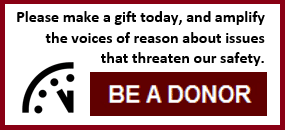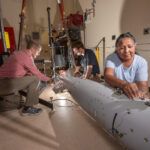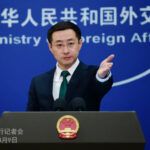Bringing Iran into the Nuclear Security Summit
By Ariane Tabatabai, | November 6, 2014

The Nuclear Security Summit held in The Hague in March brought together leaders of 53 countries to discuss how to keep nuclear and radioactive material out of terrorists’ hands. Participants included countries with large nuclear energy programs like the United States and France, budding nuclear states like Turkey, and even countries like Gabon that are far from deploying power reactors. Yet Iran, which has one of the world’s most controversial nuclear power programs, was not represented.
There is a good chance that in the coming months, Tehran will agree to a deal with six foreign powers that will scale back its nuclear program in exchange for some relief from sanctions. If that happens, the United States should invite Iran’s President Hassan Rouhani to the table at the next and likely final summit meeting in 2016.
The United States, which initiated the summit process under President Barack Obama, deliberately chose not to invite Iran to the first one, held in Washington in 2010. At that time, efforts to launch nuclear talks with Iran were stalled under President Mahmoud Ahmadinejad, and Iran was rightfully seen as a disruptive actor in international forums such as the Nuclear Non-Proliferation Treaty review conferences. US officials understandably had little desire to see Iran block progress in the new series of summits.
However, such arguments were already a bit threadbare by the time of the 2014 summit in The Hague. After all, the new Iranian government under President Hassan Rouhani had already agreed to an interim nuclear deal in November 2013 and begun successfully implementing it, indicating a willingness to engage in meaningful diplomacy. Nevertheless, the United States demurred from supporting an invitation, not wanting to reward Iran with a diplomatic carrot absent a broader agreement on its nuclear program.
Now, some foreign diplomats have already been telling the United States that if a nuclear agreement with Iran is reached, it would make sense to consider inviting the country to the 2016 summit. Such a move would have many benefits.
From Iran’s perspective, an invitation would allow it to engage with the international community on nuclear issues in a context that is not just about trying to dispel other countries’ proliferation concerns. Tehran would have the opportunity to become better integrated into broader nuclear processes, not as a subject of scrutiny, but rather as an equal and full member of the international community, engaging over the common interest of keeping nuclear material and facilities in the hands of sovereign states.
For the United States, meanwhile, inviting Tehran to the next summit could advance Washington’s goals at both a regional and global level.
Iran would join a group of six other Middle Eastern states at the summit—Egypt, Israel, Jordan, Saudi Arabia, Turkey, and the United Arab Emirates. The meeting would thus provide a forum for these countries to engage on nuclear security issues, a rare and much-needed opportunity for the region. Currently, there are few venues where the Arab states, Iran, Israel, and Turkey can meet to constructively discuss anything.
Some might argue that inviting Iran, a sponsor of terrorist groups such as Hamas and Hezbollah, to a summit aimed at combating nuclear terrorism makes little sense. On the contrary, however, including Iran in the process could strengthen its incentives not to allow nuclear or radiological material to leak to such actors. It might also allay widespread concern that such material could be smuggled from Central Asia or the Caucasus through Iran. Amid fears that rising Sunni terrorist groups in its immediate neighborhood—like the Islamic State—could resort to nuclear and radiological terrorism, Iran would have a strong incentive to cooperate.
Inviting Iran to the 2016 summit would, moreover, encourage it to take appropriate steps toward reinforcing the security of its facilities and materials. As it stands, the country’s undertakings on nuclear security leave a lot to be desired. Tehran has neither signed nor ratified the International Convention for the Suppression of Acts of Terrorism or the Convention on the Physical Protection of Nuclear Material. Nor has it expressed support for major International Atomic Energy Agency guidelines like the Code of Conduct on the Safety and Security of Radiological Sources.
Tehran has also been reluctant to discuss what steps it has taken toward strengthening the security of its facilities and materials. This partly stems from the fact that Iran’s nuclear program has been under outside scrutiny for more than a decade over proliferation concerns, and therefore adding security issues to its list of obligations would have been challenging. For the moment, Iran’s priority isn’t nuclear security, but advancing its nuclear program despite external pressure while avoiding more economic and political isolation. Another reason for Iran’s opacity is that it legitimately fears military attacks on facilities like its Natanz and Fordow uranium-enrichment plants. In Tehran’s view, transparency at these plants could make it easier for Israel or the United States to target them, as they have already done using the cyber weapon Stuxnet.
Finally, bringing Iran into the Nuclear Security Summit process would help strengthen whatever nuclear agreement (if any) is soon reached between it and the six foreign powers. Any deal worth signing will require Iran to provide unprecedented transparency into its nuclear program. If such an historic accord is achieved, it is to every country’s benefit that it be supported.
Together, we make the world safer.
The Bulletin elevates expert voices above the noise. But as an independent nonprofit organization, our operations depend on the support of readers like you. Help us continue to deliver quality journalism that holds leaders accountable. Your support of our work at any level is important. In return, we promise our coverage will be understandable, influential, vigilant, solution-oriented, and fair-minded. Together we can make a difference.















